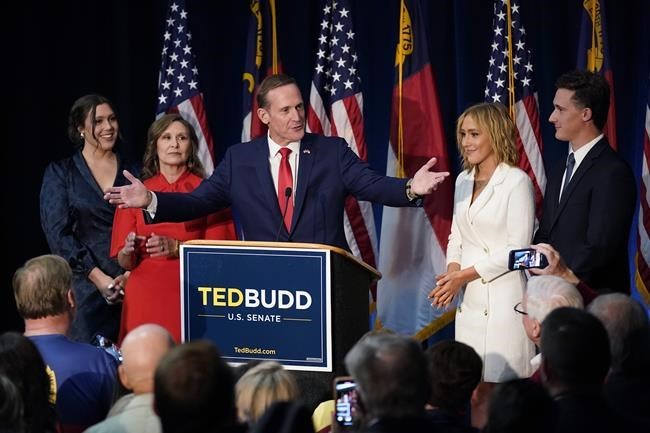Gary D. Robertson

Rep. Ted Budd, R-N.C. greets supporters with his family after winning his U.S. Senate race against Cheri Beasley at his election night watch party in Winston-Salem, N.C., Tuesday, Nov. 8, 2022. (AP Photo/Chuck Burton)
Republished November 08, 2022 - 10:03 PM
Original Publication Date November 08, 2022 - 2:16 AM
RALEIGH, N.C. (AP) — Republican U.S. Rep. Ted Budd won North Carolina’s open Senate seat on Tuesday, defeating Cheri Beasley while extending a losing streak for state Democrats seeking a spot in that chamber.
Budd, a three-term congressman, will succeed retiring GOP Sen. Richard Burr, who entered the Senate in 2005.
As a candidate endorsed by Donald Trump and ready to embrace the former president’s support, Budd will provide a more hardline conservative voice in the Senate than Burr, who voted in 2021 to convict Trump at his impeachment trial related to the Jan. 6 Capitol riot.
Beasley, a former chief justice of the state Supreme Court attempting to be the state’s first Black senator, fell short despite having a significant fundraising advantage over Budd’s campaign. But national Republicans came to Budd’s defense with a large wave of spending attacking her judicial record and support for President Joe Biden’s policies.
“It's time now to put the brakes on the Biden agenda of reckless spending, overregulation and higher taxes,” Budd during his speech to supporters late Tuesday night in Winston-Salem. “It’s time to fully support the men and women of law enforcement who keep us safe each and every day.”
Beasley’s defeat means Democrats have now lost seven of the eight Senate elections this century; their only victory coming in 2008. While North Carolina statewide elections are usually closely divided affairs, Democrats have won all but one gubernatorial election since 1992.
The Senate Leadership Fund, which is linked to Minority Leader Mitch McConnell, R-Ky., alone spent $38 million against Beasley, along with other conservative groups whose spending effectively canceled out her fundraising edge. The Democrats’ Senate Majority PAC committed to spending well less than half of that amount.
Budd was relentless during the fall campaign in attempting to link Beasley to Biden, saying last month that “she would be an absolute rubber stamp for everything that’s led to this country being on the wrong track.”
David Goodall, 51, of Apex, said he voted on Tuesday for Budd and other Republicans “because of the craziness that’s going coming out of Washington, D.C., right now — all the inflation, the craziness, the overspending, just the ridiculousness that’s coming from the left party.”
It was Trump’s June 2021 endorsement in the GOP primary that over time helped him win the nomination in 34-point rout over former Gov. Pat McCrory. The former president held rallies on Budd’s behalf in April and September, designed to intensify the candidate’s conservative base. Budd thanked Trump briefly in his speech Tuesday night.
During his only televised debate with Beasley, Budd said Biden was the legitimately elected president but defended voting in the House in early 2021 to attempt to delay the 2020 presidential election certification.
Beasley said Budd “aligned himself with somebody who is truly extremist” by embracing Trump. But Budd said the ex-president “had a lot of wins here in the state, including for our economy.”
Beasley, who was the first Black woman to serve as the state's chief justice, told supporters early Wednesday that she had spoken to Budd and congratulated him.
“This is not the outcome that we wanted, but we have made history in North Carolina,” Beasley said, adding later that the “fight will continue because progress continues.”
Beasley attempted to generate support from unaffiliated and Republican women who were fearful of Budd’s anti-abortion stance in light of the U.S. Supreme Court’s decision in June striking down Roe v. Wade. Budd has signed on to many restrictive abortion measures since coming to Washington, including a recently proposed 15-week national ban. She also said his congressional voting record was out-of-step with North Carolina voters by opposing legislation designed to control health care costs and to build infrastructure.
Beasley voter Terry Hough, 71, of Apex, said on Tuesday that she was concerned about the economy’s current path, but the threat to abortion was preeminent in her mind this fall.
Beasley “feels that it’s up to the woman. It’s ‘my body, my choice,’” Hough said. “It’s a personal right, a personal freedom that was taken away.”
Budd, 51, grew up in Davie County and previously worked in the family’s janitorial and landscaping business. He and his father also created a company to invest in agricultural businesses. Today he owns a gun store and range.
Budd had never run for public office in 2016 when he won a 17-candidate Republican primary for the 13th Congressional District seat and later the general election. He benefited from support from the Club for Growth super PAC, which also helped him in this year’s Senate primary.
As a U.S. House member, Budd has served on the Financial Services Committee — an important panel for North Carolina, the home of Bank of America Corp.’s headquarters.
Libertarian Shannon Bray and Green Party candidate Matthew Hoh also were on Tuesday’s Senate ballot.
___
This story has been updated to correct that Democrats have lost seven of the state’s eight Senate elections this century, not eight of nine.
___
Learn more about the issues and factors at play in the midterms at https://apnews.com/hub/explaining-the-elections. And follow the AP’s election coverage of the 2022 elections at https://apnews.com/hub/2022-midterm-elections.
News from © The Associated Press, 2022